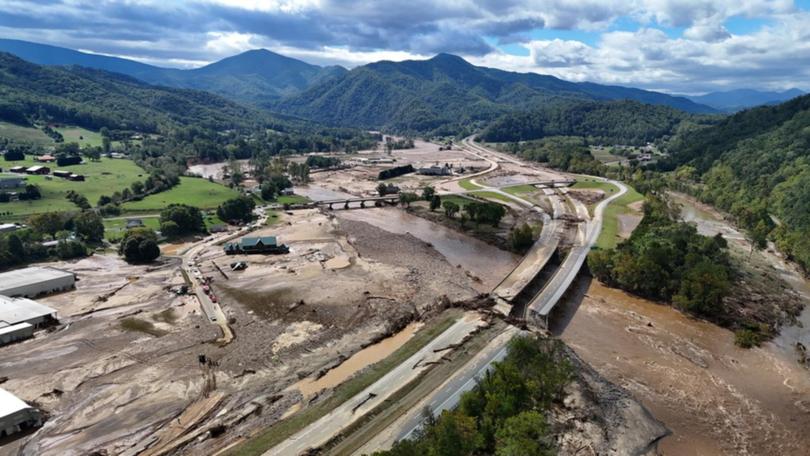Hurricane Helene: Death toll over 100 and rising as responders rush supplies amid ‘unbelievable devastation’
The death toll from Hurricane Helene barrelling has risen to over 100, with many more fatalities expected amid ‘unbelievable devastation’.

Emergency responders in western North Carolina are racing to try to reach people who remain unaccounted for three days after Hurricane Helene tore through the southeastern United States, killing more than 100 people across six states, wiping out communications and leaving millions without power.
In mountainous, hard-hit Buncombe County, which includes the city of Asheville, 35 people have died, the county sheriff said at a news briefing on Monday.
The county was set to begin distributing food and water later in the day to residents after some supplies were airlifted to the region that flooded roads and power outages have largely isolated.
Sign up to The Nightly's newsletters.
Get the first look at the digital newspaper, curated daily stories and breaking headlines delivered to your inbox.
By continuing you agree to our Terms and Privacy Policy.“We don’t have water, and we do not have power across most of the county... the roads are still hazardous,” County Manager Avril Pinder said.
In neighbouring Yancey County, the storm snapped century-old trees around the home of Taylor Shelton, 44. It took her husband two days with a chainsaw to cut a passage through the felled trees in their driveway and the nearby road so they could drive themselves and their three children out of the darkened house.
“The devastation is unbelievable,” she said in a phone interview.
She has still not been able to reach her husband’s parents, who live in the nearby town of Burnsville, which was also badly hit.
“It looks like War of the Worlds, very, very big trees are down everywhere,” she said.
“We saw houses that are just washed away.”
Mobile service remained out in large swaths from Ohio through the Carolinas and into Florida. Some 2.1 million homes and businesses were without power early on Monday, according to the website Poweroutage.us.
“The lack of communication is concerning,” North Carolina Governor Roy Cooper said on Monday in an interview with CNN.
“We know that people are missing, and we know that there’s going to be significant fatalities at the end of this and our prayers and our hearts go out to these families.”
Cooper, who said he had not heard from his son and daughter in 72 hours, added that local officials and rescue workers were performing door-to-door welfare checks in many communities.
In Buncombe, officials said they are conducting checks of 150 “priority” households that include elderly residents or residents with medical problems.
The National Guard and emergency workers from 19 states have been deployed to help, along with Federal Emergency Management Agency personnel. Cooper said the rugged terrain in the mountains of western North Carolina makes it almost impossible to traverse with landslides and flooding.
“So we’re depending a lot on air power, helicopters with hoist capacity to get supplies in,” he said.
President Joe Biden said he would visit North Carolina later this week and may ask Congress to return to Washington for a special session to pass supplemental aid funding.
“There’s nothing like wondering, ‘is my husband, wife, son, daughter, mother, father, alive?’” Biden said at the White House.
“Many more will remain without electricity, water, food and communications, and whose homes and businesses are washed away in an instant. I want them to know we’re not leaving until the job is done.”
Vice President and Democratic presidential candidate Kamala Harris cut short a campaign trip in Nevada on Monday to take part in briefings in Washington on the hurricane response and will visit the region when doing so won’t impede response efforts, a White House official said.
Republican presidential candidate Donald Trump will visit Valdosta, Georgia, on Monday to receive a briefing on storm damage.
Helene slammed into Florida’s Gulf Coast on Thursday night, triggering days of driving rain and destroying homes that had stood for decades. As it moved north it washed out roads, decimated neighbourhoods and left many communities without water and necessities.
The death toll was over 100 in the Carolinas, Georgia, Florida, Tennessee and Virginia, and is likely to rise.
Damage estimates ranged from $US15 billion to more than $US100 billion ($A22b to $A144b), insurers and forecasters said over the weekend, as water systems, communications and critical transportation routes were damaged or destroyed.
